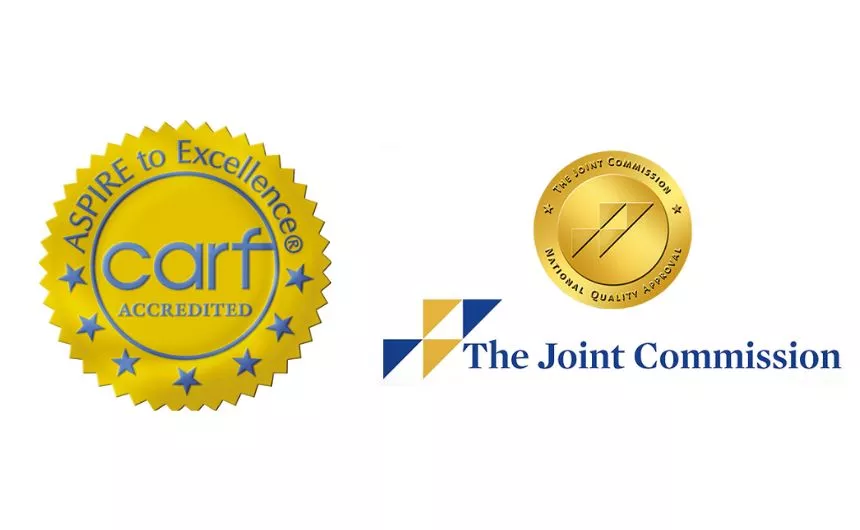Finding Addiction Treatment with CARF Accreditation
The CARF seal of approval is a mark of excellence for residential addiction treatment programs recognized by the Commission on Accreditation of Rehabilitation Facilities. If you’re in need of addiction treatment or other human services, it’s crucial that the clinic you go to has a solid reputation for quality care.
To help people find CARF accredited rehab centers, Find Addiction Rehabs maintains a large database comprised of various health and human services.
Keep reading to find out more about the CARF accreditation process, as well as how to find quality addiction treatment for yourself or a loved one today!
What Is CARF?
CARF is a nonprofit group dedicated to improving service quality that operates independently. Providers of health and human services can ask for CARF accreditation anywhere on the globe.
People in need of drug abuse and addiction treatment have access to facilities that have gone through the CARF accreditation process. CARF was first implemented in 1996.
CARF Accreditation Process and Joint Commission

Care for the public is continually enhanced by the Joint Commission on Accreditation of Healthcare Organizations. It functions apart from other nonprofits in the community. The Joint Commission has recognized more than 21,000 healthcare providers and services in the United States. It was established in 1951 with the mission of encouraging healthcare providers to improve patient outcomes while reducing costs.
A service provider that has sought and been granted CARF accreditation has demonstrated that they adhere to CARF’s requirements for the quality of their business and service delivery processes across a wide range of health and human service settings. When applying for CARF accreditation for the first time, you should expect to spend nine to twelve months on the procedure. However, the time frame is indicative of the steps required from the facility to earn CARF accreditation.
The Process for CARF Accredited Rehab Centers
It’s expected that the service provider will conduct an in-depth review of its own operations and policies. A team of specialists from CARF will conduct an on-site survey regarding health and safety concerns, and the treatment centers must prove that they can meet all of the requirements during the accreditation process.
CARF-accredited organizations have proven they meet internationally recognized standards, including ongoing counseling and thorough reviews aid a drug rehab center and other human service providers in delivering superior therapy to their clientele.
Do Clients Benefit from a CARF Accredited Facility?
Clients do benefit from CARF accreditation since it ensures the highest standards in the industry through transparency and reduced risk. Clients will receive care that is in line with global best practices, and they’ll rest easy knowing their insurance providers and other stakeholders recognize and accept CARF-accredited facilities.
A CARF-accredited provider is one that actively works to improve patient safety, reduce the potential for harm, and deliver exceptional service. This is a sign that a CARF-accredited facility providing addiction treatment has passed rigorous standards. Over 90 distinct categories of programs, 25,000 individual programs, and 3,000 organizations in the US, Canada, and Europe have become CARF-accredited.
According to the results of the National Survey of Substance Abuse Treatment Services, the United States is home to more than 14,000 distinct drug rehabilitation programs. About 22% of the nation’s programs have received accreditation from CARF.
A Framework for Effective Rehabilitation Facilities

In the United States, a drug treatment center’s accreditation can be helpful in helping those who are battling an addiction to select a facility that has a proven track record of success. Clients will have a better chance of recovering when accepted to a facility that offers evidence-based treatment, and families will be able to trust that the programs they find online are trustworthy, thanks to certification.
By choosing a facility with official accreditation, clients know they will get high-quality care that has been subjected to rigorous oversight. Accreditation requires constant attention to the most recent research in the field of addiction therapy.
Who Pays Attention to CARF Accreditations?
Insurance companies and other third-party payers look to CARF accreditations as a signal of quality when deciding whether or not to pay for a facility’s services. As a result of CARF’s rigorous standards, these institutions will provide a secure therapeutic environment, manage risks effectively, and be less of a financial risk to insurers.
When searching for drug and alcohol treatment centers in the United States, families can rest easy knowing that their loved ones are receiving care in an accredited facility that adheres to national standards and employs trained experts.
CARF Accredited Rehab Programs in the United States
In the United States, private drug and alcohol treatment services and programs amount to a multibillion-dollar business, and when people and their loved ones look for help with addiction, they typically find hundreds of adverts for addiction treatment. There is a wealth of information available online, but it can be challenging to find the most effective treatment option or one that is tailored to the individual’s specific needs.
It is important for families to know where they can find substance abuse treatment programs that are respected by experts. They may also wonder if there is a treatment center with specialists who have training and expertise in dealing with addiction.
What to Consider When Looking at Rehab Centers
Finding an approved facility is the best method for families and addicts to guarantee these kinds of standards are met in the United States, and that’s exactly what Find Addiction Rehabs does. In addition to meeting the standards set forth by individual states, many facilities that provide care for those struggling with substance abuse or mental illness are also accredited.
In the United States, if a rehab for drug abuse has earned accreditation, it has proven itself capable of providing the highest level of care to its clients. Accreditation for a drug treatment program is a lengthy process that requires an objective evaluation of the program and therapy practices against standards set by organizations like CARF, the Commission on Accreditation of Rehabilitation Facilities, and The Joint Commission, the largest accreditor of healthcare services in the United States.
What Does a CARF Accredited Program Provide?
An addiction treatment program that has been granted accreditation by one of these bodies has demonstrated that it provides care that is focused on the individual, uses evidence-based practices in rehabilitation, follows established policies and procedures, and is sensitive to the needs of underserved communities. Accreditation guarantees that a treatment center is up-to-date on health and safety regulations and that its personnel has received adequate training to do their jobs safely and effectively.
In order to gain accreditation, the institution must undergo on-site visits where management, employee qualifications, program methods, and treatment outcomes are scrutinized. Accreditation standards must be met, and effective addiction and co-occurring mental health disorder treatment programs must be implemented, both of which will play significant roles in this process.
More In-Depth Information Regarding CARF and the Joint Commission
The Commission on Accreditation of Rehabilitation Facilities (CARF) and the Joint Commission are the two main accrediting organizations in the United States. The vast majority of rehabs in the US want to earn recognition from one of these two groups. For instance, CARF accredits hundreds of categories of programs, nearly 50,000 individual, unique programs, and over 3,500 rehabilitation organizations in the United States, Canada, and Europe.
Medical centers and hospitals across the country must pass inspections by the Joint Commission, the most comprehensive of such agencies. The Joint Commission is the nation’s second-largest agency for accrediting drug and alcohol treatment facilities. Tens of thousands of substance abuse treatment facilities willingly responded to a 2013 survey. Over half of these addiction treatment programs did not have accreditation from either CARF or the Joint Commission.
Advocacy and Accountability in Addiction Treatment
Recently, there has been a greater push for substance misuse treatment programs in the United States to become certified, despite the fact that state licensing varies considerably from one jurisdiction to the next.
An organization’s dedication to being one of the nation’s leading drug rehabilitation centers is reflected in its level of accreditation, making the pursuit of accreditation a priority for drug treatment programs. Guidelines for improving treatment alternatives and services will be enacted by accrediting organizations with stricter criteria than those of individual states.
Rehab Certification and Acknowledgement
A survey in 2018 asked about accreditation, certification, and licensure. State substance misuse agencies, state mental health departments, and state departments of health are just a few of the many agencies around the country that provide licenses and accreditation.
The Joint Commission, the Commission on Accreditation of Rehabilitation Facilities, and the National Committee for Quality Assurance are just a few of the other acknowledged licensing bodies. In addition to federal, state, and local organizations, SAMSHA acted as the council on substance abuse accreditation.
Is it Hard to Find Accredited Treatment Services?

According to SAMHSA, more than 95% of all rehab facilities have received some sort of licensing, certification, or accreditation. Almost 80% of the treatment centers had licenses from state substance misuse agencies, and nearly 50% had official health department licenses. About 30% of programs received CARF accreditation, and nearly half had approvals from state mental health departments. Over 20% of the country’s drug treatment facilities have been accredited by the Joint Commission. In addition to our materials on the Joint Commission, you can learn more about what is SAMHSA with our resources as well!
The accreditation and licensing of additional treatment institutions can be found through different organizations. For instance, more than 81 percent of housing facilities were licensed, certified, or accredited. This would include halfway house settings and other residential settings considered post-treatment.
The majority of the nation’s outpatient centers (about 80%) were properly accredited and certified. More than half of all inpatient services offered by hospitals across the country were certified, accredited, or otherwise legally permitted to do so. Updated study figures can be found here.
Find the Right CARF Accredited Rehab Now!
Find Addiction Rehabs has a comprehensive list outlining CARF-accredited facilities that help you obtain only the most optimal outcomes during your stay at treatment.
To find out more about the facilities we work with and their accreditations, please reach out now for a confidential consultation with our dedicated team of recovery representatives!
* Disclaimer: Find Addiction Rehabs is not affiliated with or endorsed by CARF. Details about CARF Accreditation are intended for informational purposes only and are not an endorsement on the behalf of either CARF or Find Addiction Rehabs.

